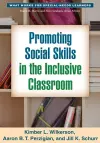
Promoting Social Skills in the Inclusive Classroom
3 authors - Paperback
£29.99
Kimber L. Wilkerson, PhD, is Professor of Special Education and Chair of the Department of Rehabilitation Psychology and Special Education at the University of Wisconsin-Madison. Before earning her doctorate, Dr. Wilkerson was a special educator in a day treatment program for students with emotional and behavioral disorders and cotaught in an inclusive elementary school program. She has published and presented on topics such as providing instruction to students in alternative settings and combining academic with social skills instruction--particularly in the area of reading. She also has experience providing both inservice and preservice instruction to increase the capacity of teachers to meet the academic and social skills needs of students with learning and behavioral disorders.
Aaron B. T. Perzigian, MS, is a full-time graduate student pursuing his doctorate in the Department of Rehabilitation Psychology and Special Education at the University of Wisconsin-Madison. Mr. Perzigian is licensed to teach middle and high school English. Prior to graduate school, he worked as an English teacher and cross-categorical special educator in a residential treatment setting. His research interests include alternative education, dropout prevention, and social competence development for children and adolescents with disabilities.
Jill K. Schurr, PhD, is Professor of Psychology at Austin College in Sherman, Texas. Dr. Schurr has developed partnerships with local schools and psychological clinics to promote the increased implementation of positive behavioral interventions and supports (PBIS) programs and availability of applied behavior analysis services in the community. Before earning her doctorate, she was a middle school teacher at an alternative school and worked as a research assistant on the Multimodal Treatment of ADHD study sponsored by the National Institute of Mental Health, providing interventions for children with attention-deficit/hyperactivity disorder. Dr. Schurr has published and presented on topics such as academic learning time, using a PBIS model to improve outcomes for students with emotional and behavioral disorders, and professional development to increase teachers' use of behavior strategies in the classroom.